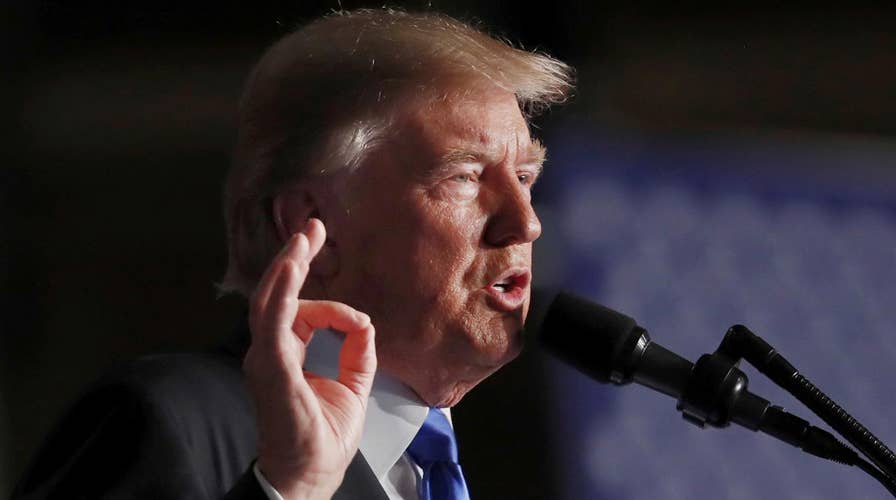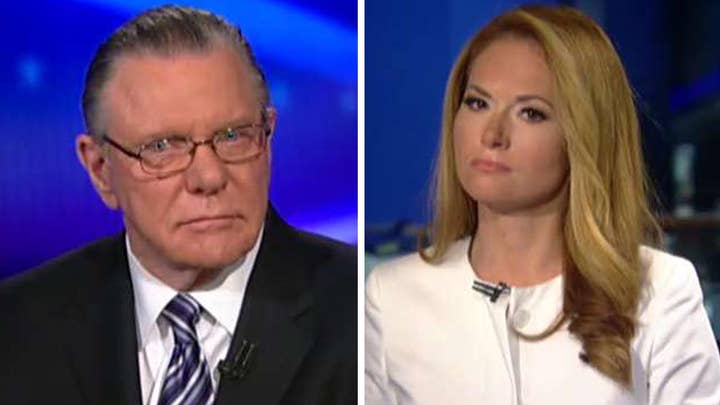Trump ramps up pressure on Pakistan in Afghanistan speech
Jennifer Griffin reports from the Pentagon
President Trump outlined a comprehensive new strategy Monday night for achieving a “lasting peace” in Afghanistan – rejecting what he called “arbitrary timetables” for the U.S. troop presence, ratcheting up pressure on Pakistan to stop harboring militants and vowing to refocus the mission on “killing terrorists,” not nation-building.
“From now on, victory will have a clear definition: attacking our enemies, obliterating ISIS, crushing Al Qaeda, preventing the Taliban from taking over Afghanistan, and stopping mass terror attacks against America,” Trump said, in a primetime address to the nation.
The speech made clear he is keeping U.S. troops in the country – he said they will “fight to win” – and scrapping any consideration of a hasty withdrawal.
Speaking to servicemembers at Fort Myer, Va., though, Trump tried to draw a sharp distinction between his approach and that of his predecessors. Pointedly, the president vowed not to openly discuss troop numbers, withdrawal dates, or attack plans.
“Conditions on the ground, not arbitrary timetables, will guide our strategy from now on,” he said, vowing, “America’s enemies will never know our plans."
Ahead of the speech, a senior U.S. official confirmed to Fox News that Trump has in fact signed off on sending an additional 4,000 troops to Afghanistan, apparently listening to appeals from his generals. But Trump’s address to the nation was focused on more than troop levels.
He stressed that the U.S. commitment to Afghanistan is not a “blank check” and the American people expect “real results.” He declared the days of democracy-building abroad are “over.”
“We are not nation-building again,” Trump said. “We are killing terrorists.”
Trump is now the third commander-in-chief to attempt to bring stability to the war-torn country and seek a U.S. victory in what is now America’s longest war. He acknowledged the American people are “weary of war without victory.”
But he sought to bring new focus to the fight Monday night, highlighting the threat that must be eradicated from upwards of 20 terror groups active in Afghanistan and Pakistan.
Trump’s warning to the latter nation marked perhaps the most significant rhetorical – and diplomatic – shift.
He said bluntly that Pakistan “often gives safe haven to agents of chaos, violence and terror,” a situation made worse by the tensions between Pakistan and India, two nuclear-armed neighbors.
Trump said a “pillar” of the new strategy is a change in approach to Pakistan. “We can no longer be silent about Pakistan’s safe havens for terrorist organizations, the Taliban, and other groups that pose a threat to the region and beyond,” he said.
Complaining that Pakistan houses the terrorists the U.S. is fighting as they take billions in aid, Trump said, “That will have to change.”
Trump’s stance on Afghanistan has shifted over the years. Prior to his candidacy, Trump called for U.S. troops to “leave Afghanistan immediately” and “rebuild the US first” on Twitter in 2013, even agreeing with then-President Barack Obama on withdrawing troops.
But since taking office, Trump has been stepping up military action in Afghanistan. The Trump administration has ramped up airstrikes in the region with 1,984 U.S. bombs dropped in Afghanistan between January and July of this year, compared with 705 dropped during the same time period in 2016 – that’s a 181 percent increase, according to U.S. Air Force data.
In his address, Trump admitted his “original instinct” was to pull out of the warzone. But he said he studied the issue and held “many meetings, over many months” with the Cabinet and generals to complete the new military plan. He said a “rapid exit” would be unacceptable, citing the example of Iraq as a cautionary tale.
“In the end, we will win,” Trump said.
The president began his address with words of unity, after a week of political turbulence and racial and cultural divide after attacks in Charlottesville, Va.
“Loyalty to our nation demands loyalty to one another. Love for America requires love for all of its people. We cannot remain a force for peace in the world if we are not at peace with each other,” Trump said.
Ahead of his primetime address, Fox News learned that the president had signed off on sending an additional 4,000 troops to Afghanistan, adding to the current estimated 8,400 U.S. troops already stationed in the region.
"I'm proud, I'm relieved. I'm proud of the fact that President Trump made a national security decision, not a political decision. I'm proud of the fact that he listened to the generals and most proud of the fact that he shows the will to stand up to radical Islam. I'm relieved that he did not take the advice to withdraw which would've been disastrous, or create a mercenary army," Sen. Lindsey Graham, R-S.C., who often has been critical of Trump, told Fox News after the address.
“Tonight, the President said he knew what he was getting into and had a plan to go forward. Clearly, he did not. The President’s announcement is low on details but raises serious questions," House Minority Leader Nancy Pelosi, D-Calif., reacted.
The stakes are high for the new strategy, which follows months of deliberations including a top-level meeting at Camp David last week. Nearly 16 years after the 9/11 terror attacks, which first drew U.S. forces into Afghanistan, the local government controls just half the country – beset by the Taliban insurgency and terrorist factions. An Islamic State affiliate has been hit hard, but continues to attempt major attacks in the region.
Vice President Mike Pence spoke with Afghan President Ashraf Ghani earlier Monday, ahead of the president’s remarks.
Politically speaking, the president also is seeking a reset after what was perhaps the rockiest stretch of his presidency thus far, one that saw multiple staff shakeups and an all-consuming controversy last week over his response to the violence in Charlottesville. The president took heat for repeatedly blaming “both sides” for the clashes at a white supremacist rally, where a counter-protester was killed in a car attack. The response was met with a bipartisan rebuke from members of Congress and a wave of resignations from various corporate and other advisory boards.
Fox News’ Judson Berger, Lucas Tomlinson and Jennifer Griffin and The Associated Press contributed to this report.























